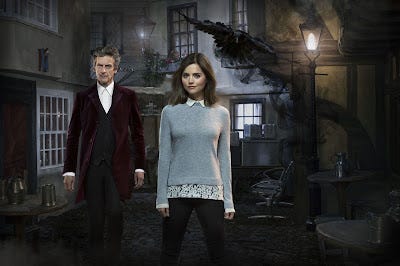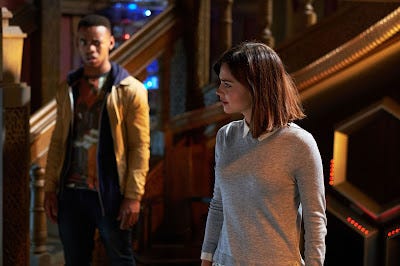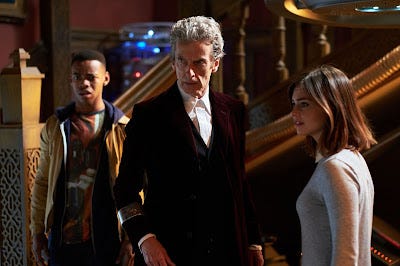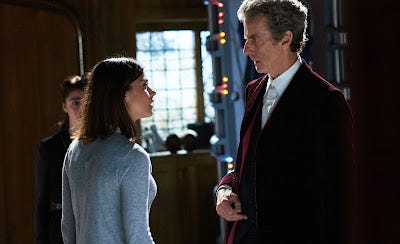"Doctor Who" Review: "Face the Raven" (Series 9 Episode 10) - "What’s the point of being a Doctor if I can’t cure you?”

As explained on last week’s podcast, I’m heading out of town starting tomorrow, which means Sean and I won’t have time to get together and discuss tonight’s Doctor Who on this week’s show. We have an episode pre-recorded, and ready to go out Monday morning, so you’ll be hearing from us – but we won’t be talking “Face the Raven” until the following week. Which is a shame, given that tonight’s episode turned out to be one of the most audacious and powerful installments not just in this all-time great season, but in the entire half-century-plus history of Doctor Who.
So yeah. I’m not going to wait a week to talk about this one. I used to write weekly reviews of Doctor Who, before our podcast discussions made them redundant, but I’m going to break tradition tonight and offer some written thoughts once again. Because if any episode warrants extra reaction, it’s “Face the Raven.”
Spoilers – many spoilers – for “Face the Raven” coming up after the jump…
“Face the Raven” presents itself as the second of two standalone episodes in this season built of two-parters, but it feels less like its own entity than the third in what we might as well call ‘the Ashildr cycle,’ following the previous Maisie Williams episodes spiritually and thematically moreso than it does narratively. All three of these stories take a fairly standard Doctor Who set-up – the Doctor helping a new group of allies, the Doctor encountering a person with sinister motives, and the Doctor trying to help a friend in the midst of an alien mystery – explore the scenario for a while, and then explode it all apart, laying bare the foundations of these narrative archetypes as they relate to the character of the Doctor, and in so doing subverting them utterly. “The Girl Who Died” did so with the death of Ashildr herself, and in the Doctor’s subsequent decision to save her. “The Woman Who Lived” did so by casting Ashildr as the antagonist in an otherwise familiar Doctor Who plot.
And now we have “Face the Raven,” which subverts the archetypal legacy of Doctor Who by having Clara Oswald – not just a companion, but a companion of three seasons and two Doctors, who has encountered two others and entrenched herself to nearly unprecedented levels within the heart of the Doctor and the audience alike – face death itself. That alone would probably be enough to make “Face the Raven” the biggest subversion of Season 9 to date, but the death of Clara, and the specific way Sarah Dollard’s exquisite script handles it, also makes “Face the Raven” an utterly shattering culmination to the single most compelling character arc in the history of modern Who.

As we have spent a lot of time discussing on the podcast, Clara hardly started out her tenure on Doctor Who as the most interesting companion. Steven Moffat had found a truly gifted actress in Jenna Coleman, and she shared some strong chemistry with incumbent Doctor Matt Smith, but her entire first season felt like a good performance in search of a character – any character. Literally, in some ways, given that Coleman was asked to play two alternative versions of Clara before we finally met the version who would travel in the TARDIS. And once we did, a lack of editorial vision, combined with a poorly conceived introductory arc involving the mystery of the ‘Impossible Girl,’ left Clara feeling like a different, increasingly bland character with each passing week.
Then came Peter Capaldi, and a chance, with his arrival, to wipe the slate clean and start fresh, a challenge Steven Moffat and company tackled so ferociously, it soon became difficult to remember the bland companion of the previous season. Capaldi and Coleman had a more remarkable chemistry than Smith and Coleman, yes, but the key lay in the writing, wherein Moffat and company constructed a companion who was atypical of many of her predecessors except on the most immediate surface level. This Clara was not defined by an attraction to the Doctor, or by an underlying mystery, or by a sense of childlike naivete; his Clara had a much more complex – and, as a result, meaningful – relationship with the Doctor than most prior companions, defined by emotional vulnerability on both their parts, while her lust for adventure and sharp, quick-thinking intellect made her more than just a match for the Doctor, but in some ways a mirror image. As Sean has observed several times on the podcast, Clara evolved not just to become someone with Doctor-esque traits, but who grew to think and act and feel like the Doctor himself, who could display similar levels of insight and heroism, but who could also be ruthless and pragmatic in ways the Twelfth Doctor gradually found himself shying away from. In a sense, she became the companion notable for being the most transformed by the Doctor, the one who organically grew to a point where she could effortlessly walk in his footsteps. When one talks about the possibility of having a female Doctor, it feels like we finally have a reference point for what that might look like, so brilliant and convincing was Jenna Coleman in embodying certain aspects of the Doctor’s personality within an otherwise unfamiliar appearance.
And so it only seems fitting that Clara Oswald would die by doing the most Doctor-like thing imaginable, and putting herself directly in harm’s way for a friend. Are the mechanics that take us from Rigsy noticing the countdown tattoo to Clara facing the eponymous raven convoluted? Absolutely, and I’ll have more to say on that in a bit. But is every step of that progression in character for Clara Oswald? Yes, and to such a degree that one could feel the hurt building long before the episode took a tonal turn to the personally apocalyptic. Of course Clara would take on Rigsy’s curse, if she felt doing so could serve a larger strategy to get them all out of harm’s way. She is a strategic thinker, a selfless individual, and most importantly, a person with a growing penchant for recklessness, a trait every single story in Series 9 has quietly pointed towards in preparation for this moment. Of course Clara would act like the Doctor when the opportunity comes to do so; that it is Rigsy she winds up sacrificing herself for – a character we know, but who we do not know or remember particularly well – feels equally organic. The point of her accidental sacrifice isn’t that it happens for the Doctor, or for any character we are intimately familiar with. Just as in the Fifth Doctor regeneration story, The Caves of Androzani, which culminates in the Doctor pushing his body as far as it will go to save a companion (Peri) he’s only just met, the point here is not the character being ‘saved,’ but what that character reflects in the person doing the sacrificing. And what Rigsy reflects in Clara is the core of her being: a will to do good and take risks, no matter the situation and potential costs.

So we have seen this kind of scenario play out before. Nearly every Doctor, in one way or another, has ‘died’ as a result of an instinct for self-sacrifice; the fifth, ninth, and tenth Doctors even regenerate due to circumstances that directly mirror Clara’s predicament here. But the difference, as the Doctor says to Clara in their final conversation, is that he is not as breakable – and so we have never seen this scenario play out in a way that feels quite so tragic or permanent. Every time the Doctor takes on someone else’s mortal burden, he endures; he goes on with a different face and altered personality, but he endures all the same. Clara Oswald will not. Clara Oswald is dead, and we shall not see the likes of her again. Therein lies the episode’s subversion, but also its truth – that as much as Clara could grow to imitate the Doctor, to act like and in some ways even surpass him, she is ultimately human. In a sense, this was the only end the character as established could ever face.
That is the key to what makes the final fifteen or so minutes of “Face the Raven” hurt so much, allows its punches to land faster and harder than I can ever recall in the history of my time watching Doctor Who. This is not just a tragic circumstance, but one built entirely out of organic character progression, where what brings these characters to this point, and what fuels their reactions once the inevitable must be confronted, is rooted in the incredible work the entire Doctor Who team in general – and Jenna Coleman and Peter Capaldi in particular – have done developing Clara and the Twelfth Doctor over these past two seasons. In Season 9 in particular, that characterization has often been muted or understated, conveyed directly through story and action and small exchanges rather than in grand gestures, and it is here that the wisdom of that subtle approach shines through. Had Doctor Who flashed a bright neon sign towards this moment all along, the power it wields would be anywhere near so powerful. But because the characterization has felt so incredibly naturalistic, so human and immediate and identifiable, the more these characters have come to live inside us, their arcs and emotions extending far beyond the boundaries of the TV screen. “Face the Raven” could have handled Clara’s death in almost any way and it would have hurt, so outstanding a job has this season done letting her character and her relationship with the Doctor quietly breathe and develop.
But the specific way “Face the Raven” handles her death is still a thing of beauty. From the moment Clara finds out she is doing to die, on through the Doctor’s final, spine-chilling threat to Ashildr, “Face the Raven” pummels the viewer with one emotional bruise after the other, each more painfully genuine than the last. Of course Clara would accept her circumstances, once their irreversibility is established; of course the Doctor would rail against her fate, would threaten to rain hellfire down against the planet he has spent many lifetimes protecting, all for the woman who has gotten under his skin and become his emotional compass to degrees no other modern companion can compete with. And of course Clara’s final actions would be to try steering her best friend away from ruination, one last time.
The writing here is beyond reproach, Sarah Dollard’s work so expertly crushing, I suspect that dialogue could compel tears on the page alone. But in the actual realization of the scene, the duet performed by Jenna Coleman and Peter Capaldi is positively transcendent, two actors who trust each other utterly, inhabiting their roles with complete confidence, throwing sadness and anger and heart-wrenching resignation back and forth to one another with an expertise that is positively electric. It is far from the first such duet Coleman and Capaldi have shared in, but it is most definitely the greatest, the culmination of a specific relationship that spans two seasons of television, the very definition of which is apparent in every second of this climactic exchange. If it was not clear before tonight, it is most definitely clear now: Coleman and Capaldi are the best dramatic pairing on all of television, and have been for two solid years, and the global TV landscape will miss this chemistry sorely when Coleman is gone. Both actors pushed each other past their limits, to places the other had never gone, time and time again, and it has been nothing less than a privilege to watch that evolution unfold.
Given that he’s the star, and that his time on the show will continue after Coleman’s has ended, it is inevitable that Peter Capaldi has received the lion’s share of the critical attention throughout these past two seasons. But I have said it before, and I must say it now again – that no matter Capaldi’s stature as an actor, he could not achieved the heights he has climbed to as the Twelfth Doctor without Jenna Coleman there to match him at every turn. That is not to say he will not continue to be brilliant after her departure, only that the Twelfth Doctor as we have so far known him is defined in relation to Clara Oswald, and that Capaldi’s performance therefore exists in union with Jenna Coleman’s. She has always been outstanding, going so far above and beyond the call of duty that one senses she’s going to cast a long shadow over subsequent companions for a long time to come. It cannot be easy to go toe-to-toe with an actor of Peter Capaldi’s stature and experience, but Coleman has made it look effortless every step of the way, and the work she does here, the way she is essentially asked to summarize and expand upon three seasons’ worth of character development in one extended sequence, is nothing short of masterful. Many companions have straddled the runs of two Doctors, but none have imbued their departure with such grace and passion that, in the end, they feel like the show’s true star and elder statesman, rather than the celebrated, top-billed thespian standing opposite them. Jenna Coleman was capable of that tonight, and I can think of no higher praise for her work.

That’s not to say Capaldi isn’t incredible here, because he most certainly is. I have said before on the podcast that this entire season feels like a response to the outstanding work Capaldi did in Series 8, and an attempt to challenge him as an actor more and more with each passing week. “Face the Raven” certainly ups the ante once again, but I love that, in the end, the ultimate challenge lies less in what he can do to overtly emote and command the situation, than in his ability to step down and let Coleman’s performance dominate when it becomes clear there is nothing the Doctor can do. His many threats towards Ashildr and other vocal outbursts are powerful, but I do not know if I have ever seen a Doctor, any Doctor, convey something quite so emotionally devastating as the look of sheer devastation and confusion that envelops Capaldi’s face in the final minutes before Clara’s demise. The core of the Twelfth Doctor, I think, has turned out to be his extreme emotional vulnerability, something he tries to mask but has grown increasingly poor at doing so. The Doctor we saw tonight was the ultimate extension of that – raw, broken, and consumed in emotional chaos.
Or do we have even further to go down that path? “Face the Raven” certainly heavies the burden placed on Capaldi beyond anything we’ve seen before, but I suspect this is just the tip of the iceberg. Dollard’s script has teed Steven Moffat up to challenge Capaldi’s skills even more in these final two episodes, to push both the Doctor as a whole and this specific characterization into more vulnerable territory than the show may have ever explored. Series 9 is already far and away the best season of modern Doctor Who, and nothing that happens in these final two episodes can change that. But if Moffat’s finale fully capitalizes on everything this season has been about, and all it has done to tear away the layers of the increasingly complex Twelfth Doctor? If Series 9 fully pays off on the most carefully laid character arc ever devised in the history of this very long show? Well, then, we would have an all-timer on our hands – nothing short of a historically great season of television.
Of course, there is room for error here, too. The mechanics that turn Clara’s clever strategy into a death sentence are convoluted, and by the end of “Face the Raven,” they still make very little sense. Who is Ashildr working for? Why did she have to promise someone a soul? What about this deal made Clara’s fate irreversible? It doesn’t seem like those questions will remain unanswered – this is clearly all set-up for the finale, and “Face the Raven” was wise not to overburden itself with exposition given the enormity of what happens to Clara – but those answers will have to be satisfying, in one way or another, for the mechanics of “Face the Raven” to feel earned, rather than cheap. The narrative here relies on pieces of plotting we have not seen yet, and while the Doctor Who team has certainly earned themselves a long rope of trust, I hope whatever happens in these last two episodes makes the story here feel more organic.
Because the character side of things is as flawless as it has ever been, and for the most part, everyone involved brought their absolute A-game to “Face the Raven” (including Murray Gold, who pulled three seasons worth of musical work together here, transforming Clara’s original theme into a new melancholy motif for a brokenhearted Doctor). And if nothing else, “Face the Raven” will always stand as an unassailable testament to the greatest strength of this current era of Doctor Who: To the genius of Peter Capaldi, to the brilliance of Jenna Coleman, and to the remarkable presence of Clara Oswald, one of the absolute greatest characters this long-running show has ever seen.
The Weekly Stuff Podcast with Jonathan Lack and Sean Chapman can be subscribed to on iTunes and followed on Tumblr. We will be back on November 23rd with a special Thanksgiving discussion, and on November 30th to discuss “Face the Raven” and next week’s episode, “Heaven Sent,” in our customary compulsive detail.

